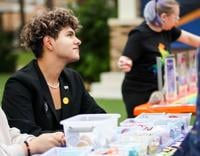
Jenna Schroeder never forgot the loneliness and isolation of her freshman year at UTA in 2022.
Schroeder was a gay girl from Austin who didn’t communicate her sexuality to others, she said. At UTA, she had no friends outside of her roommate, and clubs for LGBTQ+ students weren’t very active.
Becoming president of the Lavender Alliance in fall 2023, which she calls a safe space for UTA’s LGBTQ+ community, was nothing but a coincidence, Schroeder said.
The organization had no leader, so she stepped up.
The following academic year has been a whirlwind. Texas Senate Bill 17 went into effect Jan. 1, prohibiting public universities from maintaining many diversity, equity and inclusion practices on campus. Because the term is broad enough to include many underserved communities, resources for LGBTQ+ students also went away.
Within weeks, the website and social media platforms of the LGBTQ+ Program, which advocated for gay students on campus, disappeared. LGBTQ+ student organizations began losing funding for their events as the university complied with state law.
This October, instead of celebrating Campus Pride Month like in previous years, flyers for events focus on celebrating LGBTQ+ History Month. Currently, the Intercultural Student Engagement Center, UTA Libraries, the School of Social Work and The Queer Social Work Association are promoting five events in total.
UTA is allowed to recognize historical events, such as LGBTQ+ History Month, Black History Month, Hispanic Heritage Month and Women’s History Month, according to the UT System compliance code with SB 17.
Last year, the LGBTQ+ Program promoted about 20 events on its Instagram to celebrate Campus Pride Month, according to UTA Libraries’ Special Collections archives examined by The Shorthorn.
After SB 17, Schroeder said the Lavender Alliance had neither money nor faculty support. She also went into debt after funding got pulled. It then became a journey of learning curves while maintaining a full course load and having other personal obligations, she said.
Schroeder, however, persisted.
“I need to make sure that people have resources because I didn’t have resources, and they need to have social connections that I didn’t have, you know?” she said.

‘The only difference is we’re queer’
This October marks The Queer Social Work Association’s first anniversary. Using their background in social work, members want to be advocates for LGBTQ+ students on campus.
Within days of its creation, the association pushed for the display of pride flags inside the Social Work and Smart Hospital Building last November to commemorate Transgender Awareness Month. In March, the group spoke for transgender rights and denounced SB 17 at the Texas State Capitol.
The group of five is working with Student Government to expand all restrooms at UTA to be labeled as “all gender,” said Elwim Sorto, the association’s CEO and co-founder.
Between the state political climate and the limitations in place, surviving has been a hassle, Sorto said. Discouraging moments have arisen, and group members have grown frustrated over the past year. But they would talk to people who appreciated the association’s assistance.
“People are just out there being silent. People are isolated, and they don’t deserve to feel like that,” he said. “Everyone deserves to be happy.”
LGBTQ+ student organizations are no different from any other social student clubs on campus, as they all have members who share interests, said Brayden Wilder, software engineering sophomore and Lavender Alliance member.
“Our interest is just talking about the queer community, discussing the problems within it, discussing how we can solve it, and it’s just no different,” Wilder said. “The only difference is we’re queer and they’re not.”
‘I just want people to not feel excluded’
Before Schroeder joined Lavender Alliance, Violet Murguia was a club member in fall 2022 when it had about five active members.
Murguia was still in the closet back then, questioning her identity as a transgender woman, she said. However, using the group’s Discord server and asking members questions, she began to come to terms with her identity.
“The only way to find out I’m trans is to go through it and having people there to support me,” she said.
Murguia, the club’s public relations executive, these days forces herself to be more social and outspoken despite her anxiety. Whether it’s messaging members on Discord or attending meetings in person, she wanted people to know they have at least one friend, she said.
“I just want people to not feel excluded,” she said.
Among one of the promoted events on Lavender Alliance’s Instagram, the group posted about Lavender Graduation last April. The ceremony, which celebrates identity and culture for the graduating class, included remarks from UTA alumnus Jacob Reyes, news and rapid response coordinator at the GLAAD.
“When I gave my speech, I made sure not to beat around the bush. I made sure to say ‘LGBTQ.’ I made sure to say that students who were at the Lavender Graduation ceremony were not just there to celebrate their creativity and their individuality,” Reyes said. “They were there to celebrate the fact that they were queer and allies of the community, and it’s important to say that.”
Seeing students being impacted by SB 17 restrictions hurt Reyes personally, he said. It was at UTA that he was able to express his truest self. He returned to school in his late 20s and found his identity through the LGBTQ+ Program and the then Multicultural Affairs.
Reyes wasn’t alone. A 2023 presentation at New Maverick Orientation showed the LGBTQ+ Program’s survey of 183 LGBTQ+ students, the majority of which felt that UTA supported their identities and allowed them to express their authentic selves in class, according to archived material from Special Collections.
In 2022, UTA’s LGBTQ+ Program received a five-star Campus Pride Index rating based on the university’s commitment to LGBTQ-inclusive policies, programs and practices from Campus Pride — a national nonprofit organization working to create safer, more LGBTQ-friendly learning environments in higher education.
Reyes knows how much it means to have programs and safe spaces like the LGBTQ+ Program, he said.
On one of the floating shelves in his room displays his Lavender Graduation stole.
“Having that stole, just being able to see it every day, it reminds me that I’m in a better place because of UT Arlington,” he said.

‘I felt like I was heard’
Wilder grew up in Cypress, Texas, then moved to Katy, Texas, where they were surrounded by conservative individuals who didn’t accept queer people. Despite this, they found other queer friends and built a community.
Wilder joined the Lavender Alliance a week or two after coming to UTA, hoping to find a community just as close-knit as the one back in Katy, and they said they found it.
“I felt like I was heard, like I belonged somewhere,” Wilder said.
At around 11:55 a.m. on a fall Wednesday afternoon, more and more LGBTQ+ students showed up for a weekly meeting at the Sabine Room at the University Center. At noon every Wednesday, the group discusses educational topics related to queerness. On Fridays, they meet to socialize.
These days, Lavender Alliance has mostly recovered from debt and has received financial help through fundraising and fellow students.
The club has around 60 total members. Its growth has been overwhelming, Schroeder said, but she hopes to continue expanding, putting on events and providing resources. When people attend meetings, she wants them to feel supported and not isolated.
As the meeting went on, people continued sharing their stories. One spoke, and the others listened. At times, a student would gasp listening to their peers’ experiences.
“They should feel like they’re among friends and that they should be comfortable,” Schroeder said, glancing at a group who stayed after the meeting to chit-chat. “That’s what I work to achieve every day.”
In the 16-by-34 foot room, students had different skin colors, different gender identities and came from different backgrounds.
Yet, in that moment, they had something in common: They wanted to listen to others’ experiences as a member of the LGBTQ+ community — and be heard for theirs.
@DangHLe


















